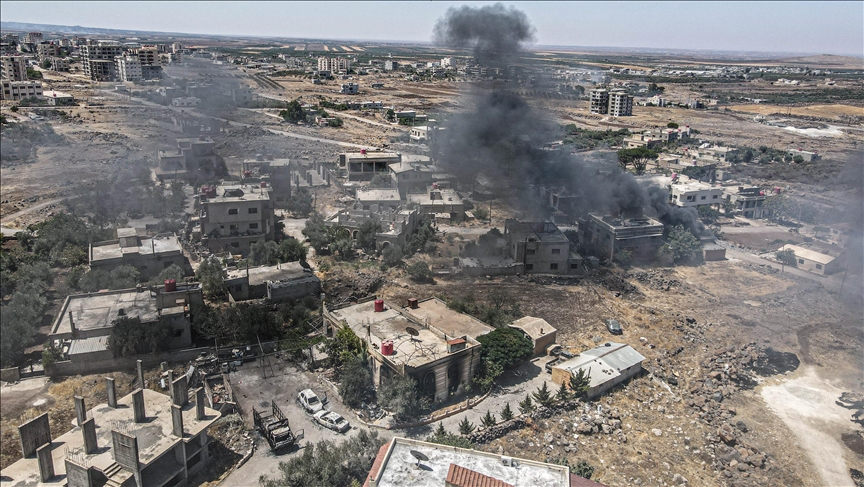Jordan, Syria, US hold trilateral talks to back Syria’s Suwayda ceasefire, reconciliation, humanitarian aid
Trilateral meeting brings together Jordanian, Syrian foreign ministers, US special envoy to Syria in Amman
 Smoke rises as clashes continue between Bedouin Arabs and some Druze armed groups in Suwayda, Syria on July 19, 2025.
Smoke rises as clashes continue between Bedouin Arabs and some Druze armed groups in Suwayda, Syria on July 19, 2025.
ISTANBUL
Jordan’s Foreign Minister Ayman Safadi, his Syrian counterpart Asaad al-Shaibani, and US Special Envoy to Syria Thomas Barrack held trilateral talks on Saturday to discuss the situation in Syria and efforts to solidify a ceasefire in the southern Suwayda province.
Meeting in Jordan’s capital Amman, Shaibani, Safadi, and Barrack – who also serves as US ambassador to Türkiye – “agreed on practical steps aimed at supporting Syria in implementing the agreement, ensuring the country’s security and stability, protecting civilians, and upholding state sovereignty and the rule of law across all Syrian territory,” the Syrian Foreign Ministry said in a statement.
The operational steps include “stabilizing the ceasefire, deploying Syrian security forces in the Suwayda province, releasing detainees held by all parties, advancing community reconciliation efforts in the province, promoting civil peace, and facilitating the entry of humanitarian aid.”
Safadi and Barrack welcomed the Syrian government's commitment to holding accountable all those responsible for violations against Syrian citizens in Suwayda, and expressed support for efforts aimed at rejecting violence, sectarianism, and attempts to incite discord and hatred.
The Syrian minister praised the role played by both Jordan and the US in reaching the ceasefire agreement, implementing it, and ensuring Syria’s security, stability, and the safety of its citizens.
On Saturday, the Syrian presidency announced a comprehensive and immediate ceasefire in Suwayda following days of unrest in the southern province.
On July 13, clashes broke out between Bedouin Arab tribes and armed Druze groups in Suwayda. Violence escalated and Israeli airstrikes followed, including on Syrian military positions and infrastructure in Damascus.
Israel cited the need to protect Druze communities as a pretext for its attacks.
However, most Druze leaders in Syria have publicly rejected any foreign interference and reaffirmed their commitment to a unified Syrian state.
Following the fall of Bashar al-Assad’s regime in December 2024, Israel intensified its air campaign in Syria and declared the buffer zone between the two countries defunct alongside the 1974 Disengagement Agreement.
Assad, Syria’s leader for nearly 25 years, fled to Russia in December, ending the Baath Party regime, which had been in power since 1963.
A new transitional administration led by Sharaa was formed in Syria in January.


